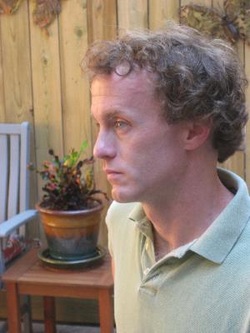Temple Cone
2008, 2010 Creekwalker Poetry Prize Finalist

Temple Cone is the author of two books of poetry, The Broken Meadow, which received the 2010 Old Seventy Creek Poetry Book Series Prize, and No Loneliness, which received the 2009 FutureCycle Press Poetry Book Prize, as well as of six poetry chapbooks. Awards for his work include two Dorothy Sargent Rosenberg Prizes, the Christian Publishers Poetry Prize, a Maryland State Arts Council (MSAC) Individual Artist Award in Poetry, and the John Lehman Award in Poetry from the Wisconsin Academy Review.
An associate professor of English at the U.S. Naval Academy, he lives in Annapolis with his wife and daughter.
e: cone@usna.edu
An associate professor of English at the U.S. Naval Academy, he lives in Annapolis with his wife and daughter.
e: cone@usna.edu
LOVE LIKE THE WILD GEESE
If you do nothing else with your life,
you can do this, you can love like the wild geese.
Because they are simple,
they do not even know what calls them
to the snow-clotted fields in spring,
only that their searing bones
light the way. Because they believe
they are immortal,
they rush over mountains, foothills, meadows
in waves of frightening speed,
since no one wants to live alone forever.
To feel air pulse beneath their wings is a blessing.
To watch two glide on a still pond,
another blessing. Even to see one
flying alone, shorn
of its mate, a kind of blessing,
because they join with their whole lives,
and even in loss cannot be rid of that
outline, always shimmering
at the tip of their outstretched wings.
Originally published in Considerations of Earth and Sky: Poems (Parallel Press, 2005)
LOONS
Between the islands, our canoe drifted,
a single stroke, now and then, keeping us
poised over the sandy, limb-tangled shallows
that dropped away into fathomless dark.
We couldn't hear waves splash ten feet away –
some trick of sound - but a mother squirrel
chirring in the pines seemed almost as close
as the bright orange vests piled at our feet.
The wind went still. Sun on the nodding lilies
lining the shore softened their yellow heads.
I felt hard words from the night before
spread like ripples, diminishing, then gone,
into the cold water that swirled behind.
When the first loon surfaced, it scanned the lake,
dove back, and rose again with another,
a little farther out, but content, at least,
to let us watch them: velvety black faces,
the throat a band of stripes, the wings a road
speckled under heavy flakes of snow.
These were the ones we heard calling at dusk
when our voices had softened: long, low notes
someone could easily mistake for cries
of grief, if they hadn't heard them before.
Originally published in Considerations of Earth and Sky: Poems (Parallel Press, 2005)
THE RECIPE
calls for flour, beer, salt, and sugar, a bread tin, and other ingredients, as desired. I twist the cap off a
bottle of Yuengling porter, sip it first, a few drops like honey in my beard, then
pour the rest in a pot over clumps of flour. The foam bubbles, then seeps through, and the batter
thickens. A tablespoon of salt. Two of sugar. Garlic buds, peeled by hand and crushed in a press,
the yellowish curds, almost blue, squeezed into the pot. Had you come in the kitchen then, you'd have
seen me clean the press of the papery pulps of garlic, rinsing my hands under cold water. But you
waited till I'd snapped shut the oven door, then snuck behind, circled your arms around my chest, your
mouth against my shoulder, breathing warmly through my sweater. I could almost turn back to smell
your hair, but ran my hand instead from your hip to your ribs, pulled loose your shirt and brushed my
fingertips against your side. When we opened the oven, the elements burned red as tanagers. You
took the first slice from the loaf, still too hot, and mumbled, mouth full, words escaping like steam,
My God, it's wonderful, wonderful bread.
Originally published in Water-Stone (2001)
CONSIDERATIONS OF EARTH AND SKY
Begin talking through the pain, not with it.
Point out the nail in the stranded post,
rusting, fenceless, like despair. Or the cows
who obey thunder's psalm by kneeling down.
Give it a name. Any name. Try creek-flood,
brush fire, snowstorm. You compound suffering
with the plain beauty of a world we're not meant for,
and you get suffering. Compounded.
Try words washed clean as pebbles. Think fjord.
There's a keen redtail up in yonder spruce.
When old men drive by, don't try to match their stares
that measure you like a dipstick does oil;
just notice how the Chevy's prime and rust,
shining through the white paint, correspond
to an Appaloosa's spots. Horse of stars.
Bless anything well-made, the north wind says;
don't romance without a good four blankets.
Hunger's a challenge at first, then a joy,
then a tool you remember to carry
everywhere. Almost ordinary, till one day
you're walking an empty highway, past rockwalls
maybe ten million years old. You look up –
granite stained with bird-lime, lichen, freeze cracks –
and realize you could eat the goddamn clouds.
Originally published in Wisconsin Academy Review (2003)
© Copyright Temple Cone. All rights reserved.